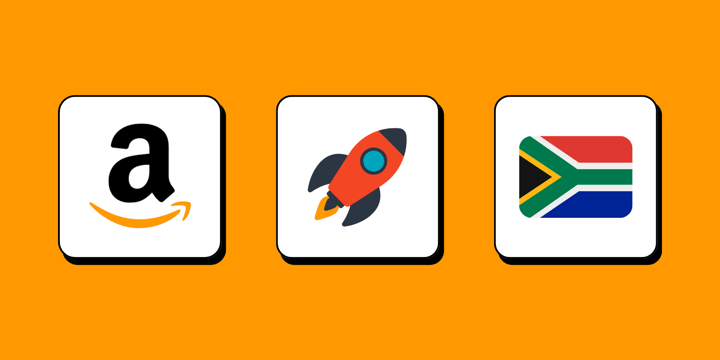After years of anticipation, Amazon finally made its mark on the South African e-commerce landscape, quiety launching its marketplace on May 7, 2024.
Undoubtedly, Amazon's entry is a boon for sellers. It will not only grow the South African e-commerce market by attracting more online shoppers but also offer sellers an additional platform to showcase their products. Moreover, it will introduce healthy competition in an e-commerce ecosystem that is currently dominated by Takealot.
Amazon has taken a measured approach to its launch in South Africa. The company started with a modest selection of products across 20 categories, with most items being sold by Amazon themselves. This is a deliberate strategy, as while sellers have been able to list and ship products to Amazon's warehouse for a few months, they were not given any prior notice that the marketplace was about to go live. Amazon appears to be focused on ensuring all processes work as expected before turning on the taps.
In the press release accompanying the launch, Amazon made its intentions clear. Much of the content focused on showcasing the benefits that the marketplace could afford to sellers.
Amazon.co.za offers independent sellers an opportunity to rapidly launch, grow, and scale
Amazon’s bet on sellers is no coincidence. Marketplaces are great businesses; they enable online retailers to offer an infinite selection without having to outlay the capital required to purchase the inventory. This allows the retailer to focus on building out its logistics and supply-chain infrastructure, which provides a significant competitive advantage in e-commerce.
Takealot has adopted a similar strategy. They’ve focused on growing their seller base whilst building logistics and last-mile delivery infrastructure. The strategy has been paying dividends, with Takealot's GMV growing by 13% in 2023 and 60% of those sales coming from marketplace sellers.
Takealot pioneered the marketplace model in South Africa and has played a crucial role in gaining consumers' trust to shop online. However, while Takealot initially competed against physical and online retailers for customers, they didn't face meaningful competition for sellers. Takealot’s monopoly over sellers has often led to them being treated as second-class citizens, perceived as expendable if they impeded the goal of customer acquisition and growth.
With many sellers generating the lion's share of their revenue from Takealot, Amazon’s entry presents a twofold opportunity. As the first viable competitor to Takealot, Amazon enables sellers to diversify their revenue streams, no longer being subject to Takealot’s ever-changing whims. Also, as competition to onboard sellers increases, sellers will likely see improvements in how they are treated, the services offered and the fees charged.
Amazon is making a long-term bet on the future of South African e-commerce, and it is going to move slowly. Sellers should not expect to generate significant revenue from Amazon initially. It took Amazon more than five years in Australia to dethrone eBay and become the country’s largest online retailer.
Takealot has spent over a decade acquiring a loyal customer base and building world-class last-mile delivery infrastructure. Customers like and know the experience that Takealot provides. While Amazon has immense brand equity, it is essentially starting from scratch and will need to work hard to gain customer trust in South Africa. In the short term, Amazon will be constrained by a limited product range and it’s dependence on third-party couriers for delivery.
Amazon may lag behind Takealot in terms of its physical footprint. But, having launched 21 marketplaces before South Africa, it brings with it a wealth of experience in growing marketplaces and acquiring customers and sellers alike.
Amazon will inevitably launch its Prime membership to hook customers with free shipping and add Amazon UK as a seller on the marketplace to significantly increase product selection—which is lacking in South African retail as a whole.
For sellers, much is still to come. Amazon will launch its sophisticated Sponsored Products Ads tool and its Vine review programme—allowing sellers to send products to top reviewers in exchange for a review—to help sellers kick-start their product sales.
Even with its initial suite of tools, Amazon’s offering sets it apart from Takealot. Today, sellers can create discount coupons for their products, use a built-in tool to automate pricing, automatically create invoices, and ship orders directly to customers—all features that are tremendously valuable to sellers and are not yet offered by Takealot
This is day one for Amazon in South Africa. Product selection is limited, Prime is not available, and most sellers have not listed their products. Amazon is making a long-term bet on the country's e-commerce potential and believes it will gradually erode Takealot’s dominance.
Takealot will not take this challenge lying down; they’ve spent the last 13 years building world-class e-commerce infrastructure that tackles many problems unique to South Africa and is well-equipped for the fight. This competition will bring about increased investment and innovation and create a larger South African e-commerce ecosystem.
For sellers, the future has never looked brighter.
